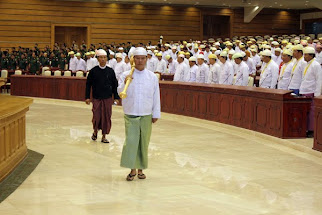Just How Deep Do Myanmar's Changes Run?
The by-election is one of dozens to be held on April 1 in what many see will be “a major test” of the reform credentials of the country’s new nominally civilian government. Suu Kyi's candidacy is the latest in a series of developments that have fed hopes for lasting democratic reform. Hundreds of political prisoners have been released, the opposition National League for Democracy is back in the political process, and the Myanmar government and the Karen National Union have a signed a cease-fire agreement, which could lay which could lay the groundwork for ending what essentially has been a 50-year civil war. Meanwhile, the United States has restored full diplomatic relations with Myanmar and is preparing to send an ambassador to Yangon for the first time since the military refused to accept a 1990 election victory by Suu Kyi's party.
Suu Kyi herself is moving ahead as the changes unfold, but she remains cautious. In a video message to Asia Society (which honored her with a prestigious award last week) she said, "Burma is on the verge of a breakthrough to democracy — we have not yet made the breakthrough."Suzanne DiMaggio, Asia Society's Vice President for Global Policy Programs, has just returned to the United States from a trip to Myanmar where she met government and opposition figures, including Suu Kyi, as well as civil society and private sector leaders. In a recent blog post, she described the pace of change there as "dizzying," but she also noted that the country was going through a "fragile period of transition."
Australia's Foreign Minister Kevin Rudd told an Asia Society audience in New York last week that he believed President Thein Sien "has embarked on a significant gamble." Nonetheless, he thought "there is a real constituency for change."
Others are more pessimistic. Longtime Burma watcher and Asia Society Associate Fellow Bertil Lintner wrote on the Asia Times Online website that: "Many Myanmar citizens undoubtedly welcome the easing of the extreme authoritarian pressure they have lived under as long as they can remember. But critics maintain the loosening is not tantamount to a 'reform process,' which would require changes in the country's fundamental power structure, and that the U.S. may have other diplomatic objectives in mind over concerns for human rights and democracy."
















No comments:
Post a Comment